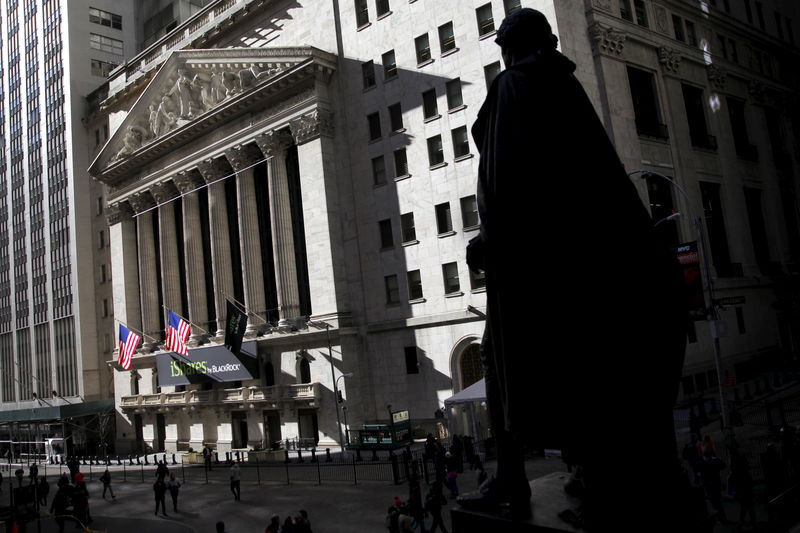Investing.com -- Stock futures inch down, hinting a possible reversal from a positive session on Monday, as Wall Street's main indices are on pace to post losses in September. Meanwhile, investors gauge developments in an ongoing budgetary stand-off in Washington, as Moody's (NYSE:MCO) warns that a potential government shutdown caused by the fight will be "negative" for the U.S.'s rating. Elsewhere, President Biden prepares to visit Michigan to show his backing for striking auto workers.
1. Stock futures edge lower
U.S. stock futures moved down on Tuesday, pointing to a pullback from gains in the previous session, with the major indices on Wall Street on track to end September lower.
At 04:49 ET (08:49 GMT), the Dow futures contract shed 117 points or 0.3%, S&P 500 futures lost 18 points or 0.4%, and Nasdaq 100 futures fell by 72 points or 0.5%.
Along with the fallout from the Federal Reserve's hawkish policy update last week, investors began the final trading week of the month eyeing an ongoing budgetary stand-off in Washington that threatens to culminate in a potential government shutdown.
On Monday, the benchmark S&P 500, tech-heavy Nasdaq Composite, and 30-stock Dow Jones Industrial Average climbed, snapping four-day losing streaks. Sentiment was supported by an uptick in shares in e-commerce group Amazon (NASDAQ:AMZN), which announced plans to invest in artificial intelligence firm Anthropic, adding more fuel to the hype around emerging AI technology.
But all of the indices are still on course to finish September in the red, with the S&P 500 in particular heading for its worst month since December.
2. U.S. House to consider spending bills as possible government shutdown looms
The U.S. House of Representatives is set to consider four conservative-backed spending bills for the upcoming fiscal year on Tuesday, although they are not widely expected to become law and may force a possible government shutdown as early as October 1.
House Speaker Kevin McCarthy, a top Republican leader in Washington, has attempted to appease some members of his party by advancing the pieces of legislation, which include restrictions on abortion access and cuts to expenditures on climate initiatives. In return, McCarthy hopes to secure enough support from far-right GOP lawmakers to pass a stopgap funding bill that would temporarily avert a shutdown.
However, hardline Republicans, many of whom were displeased with a prior spending agreement forged by McCarthy and President Joe Biden earlier this year, have expressed reservations about backing a stopgap measure.
Moody's, a credit rating agency, warned on Monday that a shutdown would "underscore the weakness" of U.S. institutions and governance compared to other countries with a similar top-notch triple-A rating.
3. Biden to visit Michigan amid auto workers' strike
President Biden will head to Michigan on Tuesday, with the famously pro-union leader tipped to show his support for the United Auto Workers union's ongoing strike against Detroit carmakers.
Biden's visit comes as Ford Motor (NYSE:F) has flagged that "significant gaps" remain in its negotiations with the UAW despite recently improving its offer. Ford, along with General Motors (NYSE:GM) and Jeep-manufacturer Stellantis (NYSE:STLA), have proposed pay rises, although the union has said differences remain around issues like pension benefits and working conditions.
The UAW's walkouts, which began on September 15 at assembly plants owned by these so-called Detroit Three firms, have led to tens of thousands of workers taking to the picket lines.
Biden, who is preparing to run for re-election next year, has yet to receive a formal endorsement from the UAW. He has called on car companies to "go further" to share corporate profits with the union's members.
Meanwhile, former president Donald Trump plans to hold a rally for auto workers in Detroit on Wednesday, as he attempts to regain the support of many blue-collar voters ahead of his own 2024 election bid.
4. Evergrande shares slip for second-straight day
Shares in China Evergrande Group (HK:3333) slumped for a second consecutive day on Tuesday after the indebted developer announced that one its main domestic units had missed an onshore bond payment.
Evergrande's Hengda Real Estate Group announced in a Hong Kong stock exchange filing that it had not paid the principal and interest on a 4 billion yuan bond that was due by September 25.
Shares in Evergrande subsequently fell by 8.14%.
It marked the latest setback for Evergrande, the embattled property group that has been at the center of a real estate crisis weighing on the wider Chinese economy. On Monday, the company's stock tumbled by more than 20% after it announced that it was unable to issue new debt because of an investigation into Hengda.
5. Oil prices decline on fuel demand fears
Oil prices dipped on Tuesday, as traders gauged how fuel demand may be impacted by key central banks suggesting that they could keep interest rates higher for longer to combat inflation.
Last week, the U.S. Federal Reserve and European Central Bank both restated their commitment to corraling price gains, hinting that policy may remain tighter for a longer-than-anticipated period of time. Such a tactic would likely hit economic activity, which in turn could dampen oil demand.
Elsewhere, Evergrande's woes this week have renewed stress over economic growth in China -- the world's largest crude importer -- over the rest of the year.
Partly offsetting these demand concerns are supplies, which are still largely tight after Russia and Saudi Arabia extended output cuts until the end of 2023.
By 04:49 ET, the U.S. crude futures traded 1.1% lower at $88.74 a barrel, while the Brent contract dropped 1.0% to $90.95.
